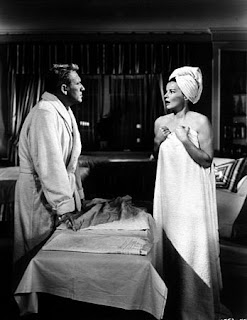Werth: Am I? It's going to be so much fun watching Alec Baldwin stutter and soliloquize, and I don't mean his performance on David Letterman.
Wise: Woody Allen is one of our greatest filmmakers, responsible for some of the best films of the last forty years.
Werth: There are a few stinkers. But you're right. Whatever mistakes Mr. Allen may have made in his personal life, he is truly one of the great directors of American cinema. One of my favorites is 1984's Broadway Danny Rose. The film opens with a gaggle of comics kvetching at the Carnegie Deli when one comic relates the funniest "Danny Rose" story.
Wise: Does it open with, "Two Presbyterians, a rabbi and a priest walk into a bar?"
Werth: Danny Rose (Allen) is a former Catskills comic who is a personal manager for a wild array of variety acts: a blind xylophonist, a one-legged tap-dancer, and the Jascha Heifetz of musical wine glasses.
Wise: Sounds like one of your cocktail parties.
Werth: Danny's best act is a mediocre Italian crooner, Lou Canova (Nick Apollo Forte) who is getting ready to sing his signature song "Agita" for a big performance that could bring him back to the big time, courtesy of Milton Berle.
Wise: Uncle Miltie knows quality.
Werth: Lou can't give his best performance unless his mistress Tina Vitale (Mia Farrow) is present, so Danny gives his client the personal touch by driving out to New Jersey to get his squeeze and bring her to the show. Only Tina isn't so anxious to come.
Wise: A mediocre Italian crooner? Who could blame her?
Werth: So Danny pulls out all the stops to convince Tina to come see Lou—and in the process winds-up being chased by hitmen through the wilds of New Jersey after he is mistakenly fingered as Tina's boyfriend.
Wise: That's happened to me a couple times.
Werth: The movie is a nostalgic joy—with amazing, seemingly real characters who populate a performance culture long gone. Mia Farrow is a revelation—practically unrecognizable as a gum-chewing, big-haired Jersey girl who believes you should stick it to the world before it sticks it to you.
And Allen does something unique in the annals of his neurotic characters: he comes off as lovable. The whiff of the judge-y intellectual is nowhere to be seen in Danny. He is a hard-working, eager beaver who's willing to go to the mat for his clients, but who never seems to get his reward in the end. The whole film is shot in black and white with Allen's intimate, cunningly casual camerawork making this world feel like a piece of verite, while at the same time cloaking it in the nostalgia of Italian novelty songs.
It's a love-letter written to the by-gone era of variety showmanship, by a man who bridged the gap between that era and modern comedy... and someone who can appreciate the genius of a gunfight in a helium balloon warehouse.
Wise: In The Purple Rose of Cairo (1985), Mia Farrow plays Cecilia, an inept waitress in Depression-era New Jersey stuck in a loveless marriage to Monk (Danny Aiello). To escape her dreary life, she retreats to the local movie house where she spends hours fantasizing about the glamorous lives of the characters onscreen, especially Tom Baxter (Jeff Daniels), a dashing archaeologist in the titular film.
After a particularly disastrous day at the diner, Cecilia is fired, but instead of going home and facing her husband's abuse, she returns to the theater. The character Tom recognizes her, and after a brief conversation, he steps off the screen to join her in real life.
The film, bereft a major character, comes to a chaotic halt, but Tom and Cecilia embark on a romantic adventure in New York, only to be interrupted by Gil Shepherd, the actor who plays Tom (also Jeff Daniels), who insists that Tom return to the confines of the picture. In the end, Cecilia must decide between the fictional world of Tom and factual world of Gil.
Werth: I pick the world with Zoe Caldwell as The Countess!
Wise: At first, the overt fantasy may feel uncharacteristic of Allen, but as the film progresses, it begins to seem barely a step beyond the usual golden-tinged nostalgia that sweetens so much of his work. The breezy pace of the dialogue helps prevent the plot from running aground, although it's the performances that really make this picture shine.
Edward Hermann and Hollywood vet Van Johnson plays denizens of the cornball film-within-a-film with a playful orotundity, while Allen regular Dianne Wiest has a ball playing a hooker attempting to seduce straight-laced Tom.
But it is Farrow who does most of the heavy lifting here, crafting a performance that is both melancholy and gilded by the madcap pluck characteristic of the films she adores.
Werth: He shoulda never left that girl... for her daughter.
Wise: Daniels also turns in fine work in his dual roles, creating two distinct characters that happen to be the same person. Allen began shooting the film with Michael Keaton in the roles, but after a week he decided that Keaton's performance felt too contemporary and replaced the actor with Daniels. Daniels earned a nomination for Best Actor, nimbly treading among his early comic scenes before arriving at his devastating final one.
Wise: And come back next week for more Film Gab...
even if we use words like "Woodypalooza."




























































